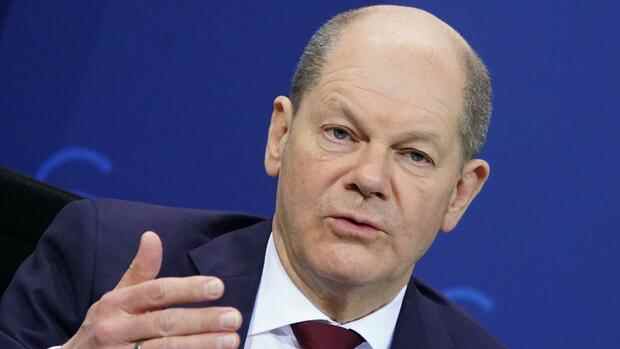The chancellor takes his time with his decisions.
(Photo: Getty Images)
During the election campaign, Chancellor Olaf Scholz already had the reputation of having learned a lot from Angela Merkel when it came to style and appearance. Now, in the Ukraine crisis, it is becoming increasingly clear how correct this impression is. “If there is a military action, it will have high costs,” he said at the end of last week after the traffic light government’s first cabinet meeting. “We are now preparing so that we can then make this decision in concrete terms.”
As almost always, he did not name any details or specific content. Scholz as Merkel 2.0.
His deputies seconded harmoniously. When asked whether the traffic light parties were also in agreement on the issue of Nord Stream 2, Vice Chancellor Robert Habeck (Greens) said: “In principle, a government is always in agreement.” The FDP leader and Federal Finance Minister Christian Lindner was eloquently silent, which Scholz did not do could be interpreted as a contradiction.
However, Germany’s refusal to supply Ukraine with defensive weapons and its reluctance to at least provide protective equipment such as bulletproof vests and helmets have not only sparked fierce criticism abroad.
Top jobs of the day
Find the best jobs now and
be notified by email.
And then there is the Nord Stream 2 Baltic Sea gas pipeline. It stands like an elephant in the room, especially between the SPD and Green coalition partners. The Greens reject the project in principle. There is not a word in the coalition agreement that explains the disagreement.
The dispute between the Chancellery and Foreign Minister Annalena Baerbock (Greens) about the possible consequences of an attack by Russia was laboriously recaptured by both sides. For years, the eco-party has railed against the project for ecological, energy and geopolitical reasons. The pipeline would be at the top of a list of concrete sanctions.
The Chancellor drives on sight
In the case of the SPD, the situation is different. Chancellor Scholz no longer describes the project as a “private-sector” project. After all, he expresses himself more verbally: It is important to act as one. This includes insisting that borders in Europe should not be violated: “We will not accept that either. (…) That would have high costs.”
Scholz does not say what that means in concrete terms, he drives like his predecessor on sight. On the other hand, SPD General Secretary Kevin Kühnert, who recently took the view that potential international conflicts, i.e. a possible attack by Russia on Ukraine, should not be talked about “in order to bury projects in this way that have always been a thorn in one’s side “. He probably meant Nord Stream 2.
Similar differences emerged in the debate over the supply of defense weapons to Ukraine. Just over six months ago, shortly before his visit to the front line in eastern Ukraine, today’s Vice Chancellor Habeck spoke out in favor of arms deliveries: “Weapons for defense, for self-defense, defensive weapons, in my opinion, it is difficult to deny Ukraine” , he said, before collecting the advance again. Friend and foe opposed it.
Chancellor Scholz made it clear to the displeasure of the NATO partners: “We do not supply lethal weapons.” Defense Minister Christine Lambrecht (SPD) also confirmed that arms deliveries would not be helpful at the moment. Germany is helping by funding the delivery of a field hospital, she added. It is scheduled to be handed over in February, but will be delivered by Estonia. The federal government is even blocking the delivery of howitzers that originally came from GDR stocks – they have been checking for days, and approval is still pending.
>> Read here: “The hardest stick is not always the smartest sword” – EU fights for penalties against Russia
Marieluise Beck, longtime spokeswoman for the Greens for Eastern Europe policy, commented on this German restraint with bitter words in the “Tagesspiegel”: “There is no doubt that a war is over most quickly when those who are attacked cannot defend themselves. Then you no longer need to deliver a field hospital. This Germany is crazy: selfishness disguised as nobility.”
The shaky position of the Liberals
The FDP stands between the SPD and the Greens and adheres to the doctrine of long-time foreign minister Hans-Dietrich Genscher: always remain open to talks. Although FDP politician Wolfgang Kubicki brought an end to Russia sanctions into play in 2018, he then proposed an import stop for Russian gas in 2020 as a possible consequence in the case of the poisoned Kremlin critic Alexej Navalny. This hit the leadership in Moscow directly.
FDP leader Lindner, as designated Federal Minister of Finance, warned Russia against aggressive actions on Nord Stream 2. He often reminds on Twitter how many days Navalny has been in prison. When it comes to human rights, the Liberals tick in a similar way to the Greens anyway. This also applies in the case of Russia and in the case of Nord Stream 2.
More: The German political elite and their Putin understanders
